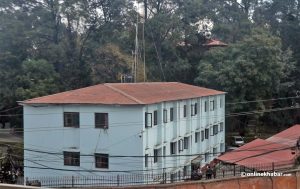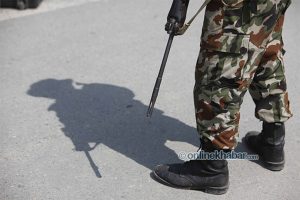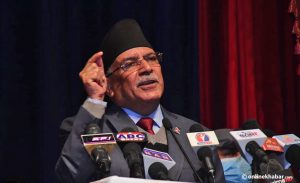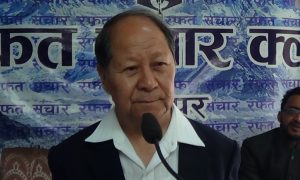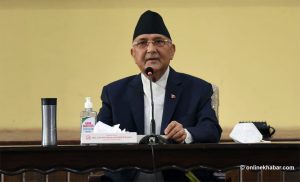When KP Sharma Oli became the prime minister for the second time, he came up with a plan to reduce the use of papers. In order to do that and promote digitalisation, Oli even gave all the ministers MacBooks. But, people close to the Prime Minister’s Office say this decision came because of different reasons.
The reason Oli insisted on making these meetings paperless was he wanted to ensure people other than the ministers did not know about the agenda of these meetings. He believed that information was being leaked out, due to which ministers from his cabinet were being pressured to make decisions in favour of others.
“He started getting calls from various interest groups asking for certain decisions to change,” says an official on the condition of anonymity. “That is why he decided to make things paperless because he didn’t want others, mostly from foreign agencies, finding out about what they were planning.”
This shows how weak Nepal’s national security is. Despite talks about the issue, not much has been done as talks have hardly happened. In Nepal, parties, leaders, and experts openly admit that self-centred foreign activities have increased. But, they are not interested in creating a foreign intelligence agency, such as the Research and Analysis Wing of India, to thwart such activities. This has resulted in foreign agencies in the country finding out information before government officials themselves.
Failed efforts
Take the incident in 2009 for example. The Armed Police Force was deployed in 18 districts bordering India. After their deployment, the personnel started to record GPS points of the various border pillars in these districts.
One day, a team of APF officers found a few Indian border officials destroying some pillars in Kailali. They were arrested and a report was submitted to the Home Ministry about this. But, as the report reached the Home Ministry, things started to get weird as outside forces started to pressurise the APF officials to take back the report. Sources say Indian intelligence agency officials from the Kathmandu-based embassy started to contact the then APF IGP Kosh Raj Onta asking what was going on.
This shows how Nepal is facing problems for not having a proper counterintelligence agency that can deal with issues like these.

Former prime minister Baburam Bhattarai has time and again stated that Nepal is run by outsiders. Despite this statement coming from someone like Bhattarai, security officials in the country hardly seem to care about establishing a powerful foreign intelligence agency.
Bhim Rawal, when he was Home Minister in 2009, had tried to create such a body. But due to external forces, he says he was unsuccessful.
“Leaders here don’t want to upset foreign powers. People from my ministry weren’t in favour of it. A year later, I wasn’t home minister anymore,” says Rawal, adding it is crucial for a country to have such a body.
The crucial need
National Investigation Department’s former chief Devi Ram Sharma also agrees that the country needs such a body. He says that such a foreign intelligence agency would be working towards the betterment of the country and help in tackling things that are bad for the country.
“Such a body would protect important information and find out who’s leaking information,” says Sharma.
Both feel that a counterintelligence body is an integral part of a country’s security system.
“In today’s age, a country needs such an agency more than strategy, money, business or natural resources. Every strong country has such a body. It should have existed over a decade ago. We need to come up with a plan on how to establish one,” says Rawal.
He says the country needs the agency mainly due to Nepal’s geopolitical conundrum.
“A lot of external forces are in play here. We have to have our own counterintelligence agency to combat this,” he adds.
Sharma feels that such a body is needed to take action against Nepalis who are committing treason.
“Treason is hardly reported in Nepal, but with such a body, I’m sure people would be tried for treason and banished from the country,” he adds.
An official at the National Investigation Department says that foreign agencies are doing illegal activities through the help of different NGOs and INGOs and adds that their regulations have not been done properly.
“We need to keep a close eye on these organisations and their activities,” says an official at the National Investigation Department.
Regression and regrets

This is not the first time that the need for a foreign intelligence agency has come to the surface. People have been talking about the need for such a body for the past 30 years. Sharma recalls that King Birendra Shah, in 1990, had set up such a body as he felt outer forces were trying to disrupt the country.
“When people started to protest for the establishment of democracy, the king felt it was done by foreign countries. That is when the Nepal Detective Department was envisioned,” says Sharma.
He says that the department was divided into two directorates, one that worked in the country and the other that worked outside it.
“There were 172 detectives who were under the leadership of DIG Prabhat Rana,” says Sharma, adding internal politics did not let the intelligence agency flourish.
Other experts say that the counter-intelligence agency was formed because of the bomb blast done by Ram Raja Prasad Singh in 1986. Singh, even though he was in India, had masterminded to blast a bomb in Nepal. It was evident to the monarchs that people like Singh were protected by India.
“We found that a lot of people were being trained in India to attack Nepal and its monarch. A few years later, other countries also started to get involved with Nepal,” says a former AIG who worked at the Nepal Detective Department.
Even though it was working, it did not last long. By 1993, things were different in Nepal. Democracy had been established, after which the counter-intelligence agency was dissolved and turned into the National Investigation Department.
There were many theories why the intelligence agency was dissolved. Some say too much work pressure while others claim that the country did not have funds to run it. But, people who worked there claim it was disbanded due to pressure from other countries.
“The home minister told us that as democracy had no threat, Nepal didn’t need an intelligence agency,” says a former member of the agency.
The agency was disbanded in 1991 and since then the country has not had such an agency despite various leaders and organisations calling for one.
Fresh efforts
After all these years, a bill to amend and integrate provisions related to the Nepal Special Service constitution and operation has been registered at the House of Representatives. This bill might open the door to establishing an intelligence agency. But, things have not moved forward.
“There is thinking that this will be misused. How odd is that,” says an official from the NID. “There is a feeling amongst us that there are external factors trying to stop the formation of a counter-intelligence agency.”
If the bill is passed and the agency is formed, it can keep an eye on high ranking officials like ambassadors and other diplomats. The agency will work towards ensuring that the country’s national security is not at risk. The agency is even allowed to tap phones.
The officials at the agency can ask for call details and other data but will only be able to use it for the purpose he/she had requested the information or data for.
But, will it be able to re-establish itself? Only time will tell because it will need honest people.
“The security agencies in Nepal are weak. So before we think about establishing a foreign intelligence agency, we need to ensure that we have people who we can trust,” says Indra Adhikari, a security expert. “Along with that, we need to start looking at how we can make the structure strong so that intelligence agencies from abroad can’t shake it.”
Currently, the National Investigation Department is misused. Even those within the organisation agree. They say that they get told to spy on political parties and even they feel that is wrong. The officials there say that after democracy, the National Investigation Department has lost its essence as it has not been able to put Nepal first.
For that to happen, experts say that they need make sure that National Investigation Department is independent of the government. They say that unless political appointments stop, Nepal will never be able to form a proper foreign intelligence agency.
“The intelligence agency should put Nepal first. It should not care who is leading the government. When that happens, they can’t work properly and these agencies should not have people affiliated with political parties,” says Adhikari.
She says Nepal needs to evolve with time too, adding while intelligence agencies across the world are using artificial intelligence, Nepal should also start this practice.
“Intelligence agencies are a step ahead of everyone. We need to ensure that we are too,” says Adhikari.








